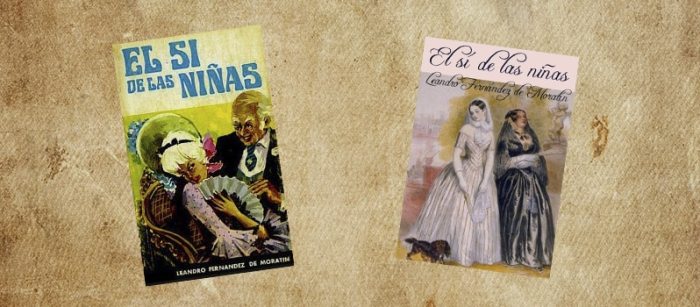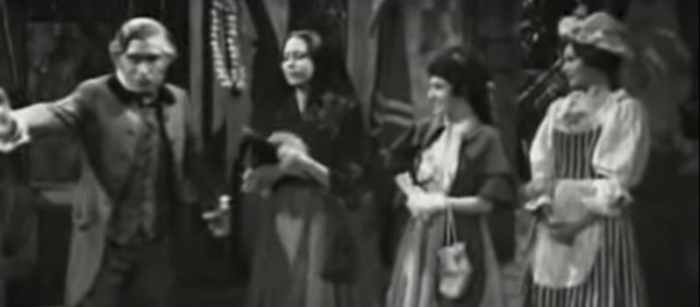El si de las ninas summary – Unveiling the essence of El Sí de las Niñas, this summary delves into a captivating world of love, duty, and the indomitable spirit of women. Step into the heart of this timeless masterpiece and discover the secrets that lie within its pages.
Set against the backdrop of 19th-century Spain, El Sí de las Niñas paints a vivid portrait of a society governed by strict societal norms and expectations. Through the lens of Doña Francisca, a widowed countess, and her daughter Inés, we witness the clash between personal desires and societal pressures.
El Sí de las Niñas

El Sí de las Niñas: Literary Analysis
The play’s title, which translates to “The Consent of the Girls,” is a significant indicator of its central themes. It reflects the prevailing social norm that women’s consent was often disregarded in arranged marriages. The play explores the consequences of this practice, highlighting the importance of individual choice and the damaging effects of forced marriages.
Characterization of Doña Francisca
Doña Francisca is a complex and compelling character. Initially portrayed as a stern and domineering figure, she gradually reveals her inner vulnerability and desire for true love. Her motivations are driven by a mix of societal expectations, personal desires, and a deep-seated need for control.
As the play progresses, her character undergoes significant development as she grapples with her own emotions and the realization of her daughter’s true feelings.
Role of Honor and Reputation
Honor and reputation play a pivotal role in the play’s plot and character development. In the society depicted, these concepts are highly valued and influence the actions and decisions of the characters. The fear of social disgrace and the desire to maintain a respectable image drive many of the characters’ choices, leading to both positive and negative consequences.
The play explores the complexities of honor and reputation, highlighting the tension between personal desires and societal expectations.
Historical and Social Context

El Sí de las Niñas is set in 18th-century Spain, a time marked by strict social hierarchies and gender roles. The play reflects the prevailing societal norms and expectations that shaped the characters’ actions and decisions.
During this period, women were expected to be submissive and obedient to their husbands. They had limited access to education and were primarily confined to domestic duties. Marriage was seen as a way to secure a woman’s future, and arranged marriages were common.
Gender Roles and Limitations
The play explores the limitations faced by women in 18th-century Spain. Doña Francisca, the protagonist, is a young woman who is forced into an arranged marriage with Don Diego, an older man she does not love. She is expected to accept her fate and fulfill her duties as a wife, even though she has no choice in the matter.
The play also highlights the importance of female education. Doña Francisca is a well-educated woman who is passionate about reading and writing. However, her husband forbids her from pursuing her intellectual interests, believing that education is not appropriate for women.
Themes and Symbolism: El Si De Las Ninas Summary

El Sí de las Niñasexplores profound themes that resonate deeply with the human experience. These themes are intricately woven into the play’s narrative, creating a rich tapestry of ideas and emotions.
Love and Duty
Love is a central theme in the play. It is portrayed as a powerful force that can overcome obstacles and transcend social conventions. However, it is also juxtaposed with the concept of duty, which often conflicts with personal desires. Characters are torn between their obligations to family and society and their own hearts’ desires.
The Struggle for Freedom
Another prominent theme is the struggle for freedom. The play explores the desire for individual autonomy and the oppressive forces that seek to suppress it. Characters yearn for the ability to make their own choices and live according to their own values, but they are often met with resistance from societal norms and expectations.
Symbolism
Symbolism plays a significant role in the play. The rose, for example, symbolizes love and beauty, but it also carries connotations of danger and passion. The nightingale, on the other hand, represents freedom and the power of song. These symbols add depth and nuance to the play’s themes, allowing the audience to interpret the characters’ actions and motivations on multiple levels.
Setting and Imagery
The play’s setting and imagery contribute to the development of its themes. The secluded convent provides a backdrop for the exploration of love and duty, while the nightingale’s song serves as a reminder of the characters’ longing for freedom. The contrast between the convent’s cloistered environment and the vibrant world outside reinforces the tension between personal desires and societal expectations.
Characters and Relationships
The play “El Sí de las Niñas” features a cast of vibrant characters whose relationships drive the plot and explore themes of love, duty, and societal expectations.
Main Characters
The central characters are Doña Francisca, her daughter Inés, and Carlos.
The story of El sí de las niñas revolves around the complexities of love and marriage. If you’re looking to enhance your understanding of the American Revolution, be sure to check out apush unit 7 mcq practice for valuable insights and practice questions.
Returning to El sí de las niñas, the play highlights the challenges faced by young women in a society that restricts their choices.
- Doña Francisca: A wealthy widow, Doña Francisca is a strong-willed and domineering matriarch who controls her daughter’s life and aspirations.
- Inés: A young and innocent girl, Inés is torn between her desire for love and her duty to obey her mother.
- Carlos: A young and idealistic man, Carlos falls deeply in love with Inés and challenges Doña Francisca’s authority to pursue his love.
Doña Francisca and Inés, El si de las ninas summary
The relationship between Doña Francisca and Inés is complex and strained. Doña Francisca is determined to marry Inés to a wealthy suitor, Don Diego, to secure her family’s financial future. However, Inés has secretly fallen in love with Carlos, and her mother’s plans threaten her happiness.
Carlos and Inés
Carlos and Inés’s love is forbidden by Doña Francisca. Despite the obstacles, they find ways to communicate and express their feelings for each other. Carlos’s determination and Inés’s willingness to defy her mother create a romantic tension that drives the play’s plot.
Plot and Structure

The play follows the romantic entanglement of Don Diego and Francisca. The plot thickens as their secret relationship is threatened by the arrival of Paquita, a young ward who is also in love with Don Diego.
The play’s rising action centers around the growing tension between Don Diego and Paquita, who becomes increasingly jealous of Francisca. The climax occurs when Don Diego is forced to choose between the two women, leading to a dramatic confrontation.
Dramatic Irony and Suspense
Moratín uses dramatic irony to create suspense throughout the play. The audience is aware of the secret relationship between Don Diego and Francisca, while the other characters remain in the dark. This creates a sense of anticipation and unease, as the audience wonders when and how the truth will be revealed.
Structure and Meaning
The play’s structure contributes to its overall impact and meaning. The rising action and climax build suspense and lead to a satisfying resolution, while the use of dramatic irony adds depth and complexity to the characters and plot.
Frequently Asked Questions
Who is the protagonist of El Sí de las Niñas?
Doña Francisca, a widowed countess
What is the central conflict of the play?
The clash between personal desires and societal expectations
What is the significance of the title El Sí de las Niñas?
It refers to the societal expectation that young women should blindly obey their elders, even in matters of love